
.

.

.

.
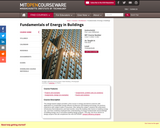
This design-based subject provides a first course in energy and thermo-sciences with applications to sustainable energy-efficient architecture and building technology. No previous experience with subject matter is assumed. After taking this subject, students will understand introductory thermodynamics and heat transfer, know the leading order factors in building energy use, and have creatively employed their understanding of energy fundamentals and knowledge of building energy use in innovative building design projects. This year, the focus will be on design projects that will complement the new NSTAR/MIT campus efficiency program.

This book is designed to accompany a graduate-level instructional design course: Game-Based and Adaptive Learning, but could also be used for undergraduate teacher education or instructional design courses.
The original texts and material for this book came from the development of a course for Brandeis University as part of their MS in Learner Experience Design program. This material can be used to teach pre-service teachers, in-service teachers, and instructional designers about game-based and adaptive learning. Assessments used in the actual Game-based and Adaptive Learning course are included in the final chapter and serve as recommendations for assessments of the learning outcomes. The material in this book pairs well with Using Game-Based Learning Online – A Cookbook of Recipes by The EGG.
The Faculty Showcase materials were developed by dedicated faculty during the course of a year-long game development workshop in which faculty were introduced to GBL, developed game prototypes, played a variety of games, and finally playtested their designs. The work they continue to do in the area of GBL is part of the inspiration for this book. If you would like to contribute your own case study, please contact me at carrie.miller@mnsu.edu for consideration.
Carrie Lewis Miller, Ph.D.- editor/author- Instructional Designer, Minnesota State University, Mankato
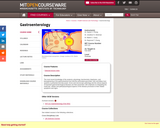
Presents the anatomy, physiology, biochemistry, biophysics, and bioengineering of the gastrointestinal tract and associated pancreatic, liver, and biliary systems. Emphasis on the molecular and pathophysiological basis of disease where known. Covers gross and microscopic pathology and clinical aspects. Formal lectures given by core faculty, with some guest lectures by local experts. Selected seminars conducted by students with supervision of faculty. Permission of instructor required. (Only HST students may register under HST.120, graded P/D/F.) The most recent knowledge of the anatomy, physiology, biochemistry, biophysics, and bioengineering of the gastrointestinal tract and the associated pancreatic, liver and biliary tract systems is presented and discussed. Gross and microscopic pathology and the clinical aspects of important gastroenterological diseases are then presented, with emphasis on integrating the molecular, cellular and pathophysiological aspects of the disease processes to their related symptoms and signs.
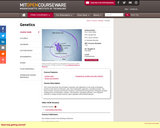
The principles of genetics with application to the study of biological function at the level of molecules, cells, and multicellular organisms, including humans. Structure and function of genes, chromosomes and genomes. Biological variation resulting from recombination, mutation, and selection. Population genetics. Use of genetic methods to analyze protein function, gene regulation and inherited disease.
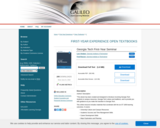
This ebook has been created and designed to introduce incoming Georgia Tech students to campus resources, Georgia Tech culture and traditions, and to provide you with guidance as you make the transition to Georgia Tech.
This online resource includes materials that coordinate with the six GT 1000 learning outcomes. It covers:
University Culture and Campus Resources
Academic Success and Time Management Skills
Career Development Skills
Major Exploration and Planning
Communication and Relational Skills
This resource includes readings, videos, and assignments that have been designed specifically to help new Tech students on their journey to academic, personal, and professional success."
This Open Textbook for GT 1000 was created under a Round Nine Textbook Transformation Grant. The web version of the text is available on the GT 1000 Textbook Website.
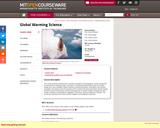
Many of our readers will no doubt already be familiar with MIT˘ďď_s excellent OpenCourseWare (OCW), which offers free college-level curricula online to the public. The OpenCourseWare site is well worth a browse, as it offers courses on a variety of useful and engaging subjects such as business, health and medicine, mathematics, fine arts and science. This particular course, which was originally offered to undergraduate students in the spring of 2012, looks at the science behind global warming. Content includes lecture notes, assignments and student projects. The content could be used as a springboard for instructors teaching similar classes, or may prove useful to curious individuals looking to learn more about this timely and important topic.
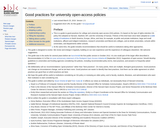
This is a guide to good practices for college and university open-access (OA) policies. It's based on the type of rights-retention OA policy first adopted at Harvard, Stanford, MIT, and the University of Kansas. Policies of this kind have since been adopted at a wide variety of institutions in North America, Europe, Africa, and Asia, for example, at public and private institutions, large and small institutions, affluent and indigent institutions, research universities and liberal arts colleges, and at whole universities, schools within universities, and departments within schools.
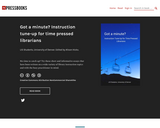
No time to catch up? Try these short and informative essays that have been written on a wide variety of library instruction topics and with the busy practitioner in mind.
TABLE OF CONTENTS
I. Renewing
1. Librarians in Learning Management Systems: Strategies and Suggestions
2. A Busy Librarian’s Guide to Youtube
3. Visual Literacy in the Classroom
II. Revitalizing
4. Really Really Ridiculously Good-Looking: Best Practices for Creating LibGuides
5. How one-shot library instruction is failing transfer students
6. Driving in a Parkway and Parking in a Driveway: Preparing for International Students in your Classroom
7. Teaching Technology to Seniors
III. Trail-blazing
8. Visible Thinking and the Implications for Instruction Librarians
9. Citation Managers on a Shoestring
IV. Challenging
10. Connect the Dots: An Exploration of Connectivism in Theory and Practice
11. Wake Up and Smell the Bias! Spreading Awareness in Library Instruction
12. Designing Asynchronous Content
V. Exploring
13. Digital is Just Another Format: How Children’s Librarians Can Apply Traditional Strategies to New Media
14. Tale Blazers: Digital Storytelling in Library Instruction
15. School Library Topics in Two’s
VI. Extending
16. How Intellectual Freedom Can Be Highlighted, Integrated, & Safeguarded in Modern Public Library Instruction
17. Health Literacy in Public Libraries
18. Using Digital Resources for Student Instruction
VII. Caring
19. Library Burnout: Recognizing the causes and dealing with the effects
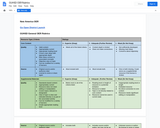
A rubric designed by the Grossmont Unified High School District to be used when assessing the quality of resources.
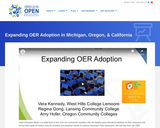
Open Education Week is an ideal time to hear from our community members who are leading open education initiatives on their campuses and across their states to reduce costs for students and empower faculty to enhance learning in their classrooms. We will hear from two OER librarians and a faculty member who are successfully growing awareness and adoption of open educational resources. They will share the successes and challenges of coordinating statewide efforts and influencing their colleagues to adopt OER in their courses.
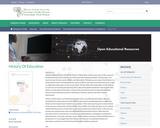
You are welcome to this Module in History of Education, which covers part of the course in Professional Education Studies. To understand the meaning of History of education, you need to know the key words, History and Education. Perhaps you are aware that History is a study of past events and developments some of which may have occurred many years of ago or might have taken place in the recent times. On the other hand, education can be defined as a process of teaching and learning. More about this will be examined in the module later. History of education is therefore a study of the past that focuses on educational issues. These include education systems, institutions, theories, themes and other related phenomena.
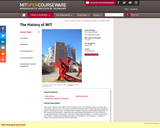
This course examines the history of MIT through the lens of the broader history of science and technology, and vice versa. The course covers the founding of MIT in 1861 and goes through the present, including such topics as William Barton Rogers, educational philosophy, biographies of MIT students and professors, intellectual and organizational development, the role of science, changing laboratories and practices, and MIT's relationship with Boston, the federal government, and industry. Assignments include short papers, presentations, and final paper. A number of classes are concurrent with the MIT150 Symposia.
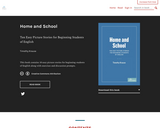
This book contains 10 easy picture stories for beginning students of English. The stories have a Lexile level of 100L-500L and address common home and school situations. Each story includes images, self-correcting comprehension exercises, and a conversation prompt.
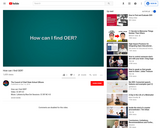
Brief video describing where and how to find Open Educational Resources, including specific repositories and licences to look for.
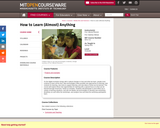
Examines how new computational tools and activities can help people learn new things in new ways. Discusses theories of learning and education underlying the design and use of these tools, and explores how new tools can change the ways people think about learning and education. Special emphasis on "constructionist" approaches to learning (represented by tools such as StarLogo and programmable LEGO bricks). Final project involves the design and observation of learning activities. As the digital revolution brings with it radical changes in how and what we learn, people must continue to learn all the time. New technologies make possible new approaches to learning, new contexts for learning, new tools to support learning, and new ideas of what can be learned. This course will explore these new opportunities for learning with a special focus on what can be learned through immersive, hands-on activities. Students will participate in (and reflect on) a variety of learning situations, and will use Media Lab technologies to develop new workshops, iteratively run and refine the workshops, and analyze how and what the workshop participants learn.
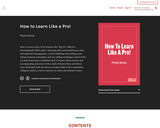
How to Learn Like a Pro! features the “big six” effective learning/study skills topics:
- Learning styles and preferences
- Time and materials management
- Critical thinking and reading
- Note-taking
- Memory principles and techniques
- Test-taking
Each of the six units featuring a total of twenty-three lessons and accompanying exercises (with a dash of humor here and there) were developed with the diverse student body of the community college in mind as well as learners in other educational venues.

How to Learn Like a Pro! features the “big six” effective learning/study skills topics:
- Learning styles and preferences
- Time and materials management
- Critical thinking and reading
- Note-taking
- Memory principles and techniques
- Test-taking
Each of the six units featuring a total of twenty-three lessons and accompanying exercises (with a dash of humor here and there) were developed with the diverse student body of the community college in mind as well as learners in other educational venues.